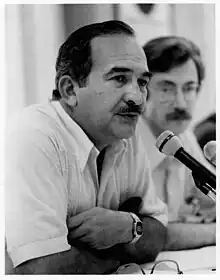Enrique Álvarez Córdova
Enrique Álvarez Córdova (March 4, 1930, San Salvador – November 27, 1980, San Salvador) was a politician and statesman of El Salvador.
Enrique Álvarez Córdova | |
|---|---|
 | |
| Born | March 4, 1930 |
| Died | November 27, 1980 |
| Parent(s) | Enrique Álvarez Drews Carmen Córdova de Álvarez |
| Relatives | Mauricio Álvarez (cousin)[1] |
Biography
Enrique was the son of one of El Salvador's ruling families. He was intelligent, charismatic and wealthy. His mother was surnamed Córdova.
Álvarez attended Rutgers University in New Brunswick, New Jersey. During his time there he was involved in Kappa Sigma (Gamma Upsilon).
After a frustrated attempt to be a Salvadoran "New Dealer," attempting to implement agrarian reform as El Salvador's minister of agriculture and cattle raising, Álvarez dramatically changed course and joined the Democratic Revolutionary Front (Frente Democrático Revolucionário or FDR).[2]
Death
On November 27th, 1980, Álvarez and five other FDR directors were kidnapped from a meeting in El Salvador's capital, San Salvador. According to the November 29th, 1980 issue of El Diario de Hoy cited by former Dartmouth researcher John W. Lamperti, their bodies were discovered outside the capital on November 28th. Enrique himself had "sustained twelve bullet wounds: ten in the back, one in the head and one in the arm, plus three other wounds in the back."[3]
Aftermath
The right-wing extremist group Maximiliano Hernández Martínez Anti-Communist Brigade (Brígada Anticomunista Maximiliano Hernández Martínez) claimed responsibility for the kidnapping and subsequent murders. Given the volatile situation present at the time, the crime sparked public outcry, curtailing hopes for a political solution to the Salvadoran Civil War, which began that same year. Despite denying any involvement, in 1993 the post-Salvadoran Civil War United Nations Truth Commission reported a strong connection between high level government security forces and Enrique's murder, however it was unable to identify the perpetrators.[4] Enrique was later described by San Salvador archdiocese member Monsignor Ricardo Urioste as "the first rich man who gave his life for the poor of El Salvador."[5]
Sources
Footnotes
- Enrique Alvarez Córdova: Life of a Salvadoran Revolutionary and Gentleman by John Lamperti. Jefferson, N.C.: McFarland & Co., ©2006.
- Lamperti, Enrique Alvarez: ¡Presente!
- https://math.dartmouth.edu/~lamperti/centralamerica_presente.html Enrique Alvarez: ¡ Presente !
- Betancur, Belisario Figueredo, et al. “From Madness to Hope: the 12-Year War in El Salvador:Report of the Commission on the Truth for El Salvador.” United States Institute of Peace, 1993, pp. 50–54., https://www.usip.org/sites/default/files/file/ElSalvador-Report.pdf .
- Lamperti, ibid., quoting Msgr. Ricardo Urioste.